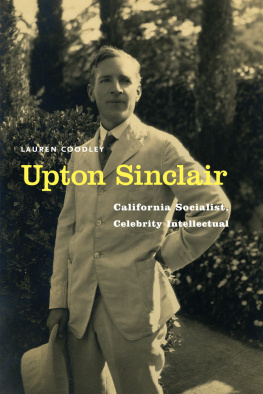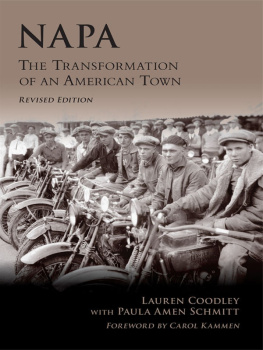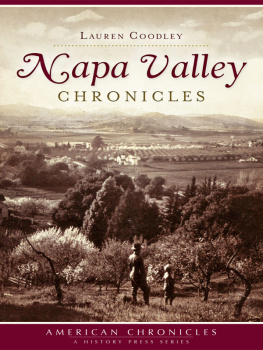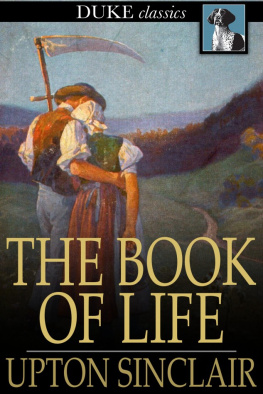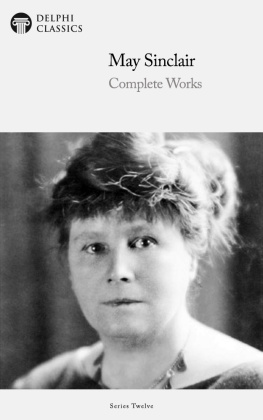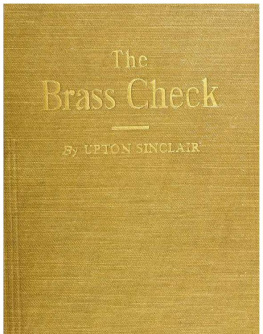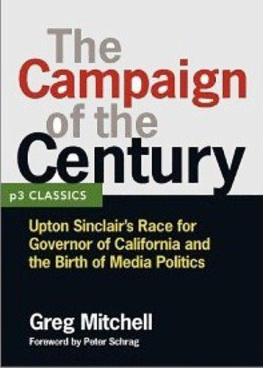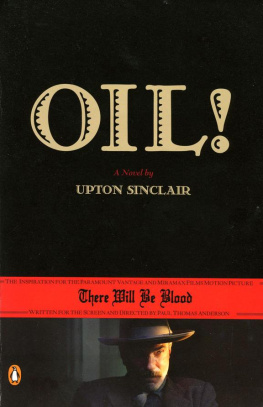

2013 by the Board of Regents of the University of Nebraska
For America, by Jackson Browne 1986 Swallow Turn Music. Used with permission.
All rights reserved
Publication of this volume was assisted by a grant from the Friends of the University of Nebraska Press.
Library of Congress
Cataloging-in-Publication Data
Coodley, Lauren.
Upton Sinclair: California socialist, celebrity intellectual / Lauren Coodley.
pages cm
Includes bibliographical references
and index.
Epub ISBN 978-1-4962-0978-8
Mobi ISBN 978-1-4962-0979-5
1. Sinclair, Upton, 18781968. 2. Social reformersCaliforniaBiography.
3. Novelists, American20th century
Biography. 4. Social changeUnited
StatesHistory20th century.
5. Investigative reportingUnited StatesBiography. I. Title.
PS 3537. I 85 Z 59 2013
813.52dc23 [B] 2013004489
Set in Sabon Next by Laura Wellington.
Designed by Nathan Putens.
The publisher does not have any control over and does not assume any responsibility for author or third-party websites or their content.
The kid I was when I first left home
Was looking for his freedom and a life of his own
But the freedom that he found wasnt quite as sweet
When the truth was known
I have prayed for America
I was made for America
I cant let go till she comes around
Until the land of the free
Is awake and can see
And until her conscience has been found
JACKSON BROWNE, For America
Illustrations
Preface
Upton Sinclair both disrupted and documented his era. The impact of his most famous work, The Jungle , would merit him a place in American history had he never written another book. Yet he wrote nearly eighty more, publishing most of them himself. What Sinclair did was both simple and profound: he committed his life to helping people of his era understand how society was run, by whom and for whom. His aim was nothing less than to bury capitalism under a barrage of facts, as Howard Zinn describes it.
Upton Sinclair introduced himself to American readers in 1906 with the publication of The Jungle , his expos of the meatpacking industry. He was only twenty-five years old. For the next six decades, he would remain an unconventional, often controversial, and always innovative character in American life. He was also a filmmaker, a labor activist, a womens rights advocate, and a health pioneer on the grandest scale a lifetime surprisingly relevant for twenty-first-century Americans.
A hundred years ago, investigative journalism was just being conceived, and Sinclairs undercover reporting on the conditions in a meatpacking plant may have been its birthing moment. Filmmaking was beginning to change the way stories were told and how people gained access to information. His friends were experimenting with sexual freedom and birth control, but the shadow of alcoholism was beginning to take its toll in the radical community, and Sinclair would record his own assessment of the dangers of alcohol in his novel and later film The Wet Parade .
Sinclair critiqued institutions ranging from organized religion to journalism to education. These analyses remain surprisingly relevant. The problems with education and with media concentration, which Sinclair identified so presciently in 1920, have become impossible to ignore.
In the first decades of the twentieth century, organized labor was struggling with the question of how to cope with the emergent hegemony of large-scale corporate capitalism. Sinclair responded by organizing a daily picket of Rockefeller headquarters in New York City to show support for embattled coal miners in Colorado. That same year he wrote a science fiction novel, The Millennium , which predicted what life would be like in 2013 with startling accuracy.
His activism was as attuned to his time and as contemporary as the Occupy Wall Street movement is today. Sinclair demonstrated not only how a writer attempts to change history through literature but also lends his or her personality to the political struggles of the times. A conscious creator of popular history, Sinclair himself starred in one of the first prolabor films, The Jungle , in 1914. He wrote Boston to document the Sacco-Vanzetti trial; Oil! exposed the depredations of the oil industry in California; Singing Jailbirds in 1924 recorded the imprisonment of Wobblies in Los Angeles.
In his sixties, Sinclair wrote a series of antifascist spy novels, the Worlds End series. The series was, as Dieter Herms has noted, antifascist propaganda entertainingly packaged in the wrappers of popular literature. The books garnered him best-seller status again, and in 1942 he became the oldest author to receive a Pulitzer Prize. This biography incorporates the many lives changed by Upton Sinclair intellectuals, union leaders, and common citizens, who were impacted by not only the Worlds End series but by his other novels, his plays, and by his EPIC Campaign for governor of California.
All involve social change in which his books were instrumental. Nowhere in this list of accomplishments is there a judgment that any of his novels represent an exclusively literary achievement. Yet, oddly enough, it has been left to literary critics to assess his reputation.
Part of Sinclairs political analysis was that a healthy and sober personal life would make him a more effective agent of change an early understanding of what would become a radical injunction that the personal is political. Sinclair, writes critic William Bloodworth, made an unusually vigorous attempt to combine questions of food with political propaganda. As the adult child of an alcoholic, Sinclair was almost alone among his radical colleagues in abstaining from alcohol for political reasons, and his embrace of temperance is one of the many aspects by which contemporary historians might reevaluate him. Temperance crusader Frances Willards argument that the welfare of women and children suffered from the effects of male alcoholism animated Sinclairs crusade. He was not afraid of identifying with what many at the time considered a womens issue. His mothers temperance beliefs and his fathers alcoholism made him a lifelong crusader both for Prohibition and for temperance.
Indeed, Upton Sinclair was a man who challenged conventional masculinity. In that sense, he was ahead of his own time and vitally relevant to ours. He was a radical much influenced by women. His interest in communal living and communal childcare is quite unusual. Yet until now, the available Sinclair criticism has omitted discussion of Sinclairs feminism.
This book includes, for the first time, some of the extraordinary correspondence that Upton Sinclair maintained with many of the leading women activists of the twentieth century. Sinclair exemplifies an alternative identity for male radicals in the first half of the twentieth century; the connections between Sinclairs personal and political decisions can help us make sense of his story. This work will add to the scholarship produced by the two fine biographies published in 2006; I will be citing important insights from Anthony Arthur and Kevin Mattson. All chapter titles in my book are based on works written by Upton Sinclair.
Upton Sinclairs activism spanned half a century, and he wrote book after book in an effort to draw others to his causes. As his son, David, recalled, My father used to say, I dont know if anyone will care to examine my heart after I die. But if they do, they will find two words there: social justice. Because Sinclair was so passionately engaged in the world around him, his story is inextricably linked to the major struggles that gave his life meaning. It is my hope that this work will offer a fresh understanding of the life and times of Upton Sinclair.
Next page
